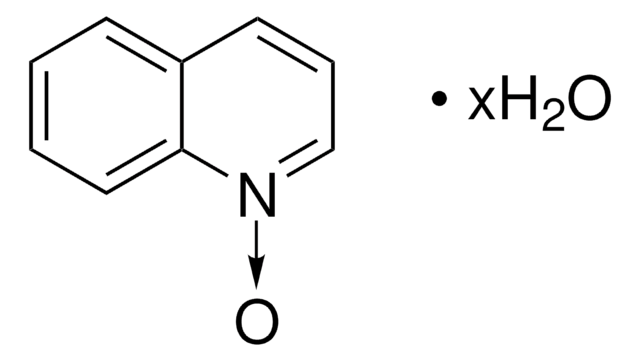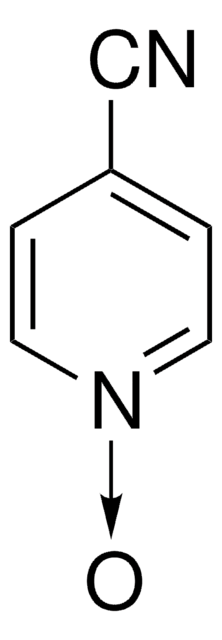All Photos(1)
About This Item
Empirical Formula (Hill Notation):
C5H5NO
CAS Number:
Molecular Weight:
95.10
Beilstein:
105257
EC Number:
MDL number:
UNSPSC Code:
12352100
PubChem Substance ID:
NACRES:
NA.22
Recommended Products
Assay
95%
form
solid
bp
270 °C (lit.)
mp
62-67 °C (lit.)
SMILES string
[O-][n+]1ccccc1
InChI
1S/C5H5NO/c7-6-4-2-1-3-5-6/h1-5H
InChI key
ILVXOBCQQYKLDS-UHFFFAOYSA-N
Looking for similar products? Visit Product Comparison Guide
General description
Pyridine N-oxide axle with [2]rotaxanes was synthesized via an anion templated threading-followed-by-stoppering strategy.
Application
Pyridine N-oxide was used to study the FTIR spectra of pyridine N-oxide in acetonitrile.
Storage Class Code
11 - Combustible Solids
WGK
WGK 3
Flash Point(F)
289.4 °F - closed cup
Flash Point(C)
143 °C - closed cup
Personal Protective Equipment
dust mask type N95 (US), Eyeshields, Gloves
Certificates of Analysis (COA)
Search for Certificates of Analysis (COA) by entering the products Lot/Batch Number. Lot and Batch Numbers can be found on a product’s label following the words ‘Lot’ or ‘Batch’.
Already Own This Product?
Find documentation for the products that you have recently purchased in the Document Library.
Daniele Sanna et al.
Dalton transactions (Cambridge, England : 2003), 41(24), 7304-7318 (2012-05-12)
The behaviour of the systems formed by VO(2+), 2-hydroxypyridine-N-oxide (Hhpo) and 2-mercaptopyridine-N-oxide (Hmpo) was studied both in solution and in the solid state through the combined application of spectroscopic (EPR and UV-Vis spectroscopy) and DFT methods. The geometry of solid
Palladium-catalyzed (N-oxido-2-pyridinyl)methyl transfer from 2-(2-hydroxyalkyl)pyridine N-oxide to aryl halides by beta-carbon elimination.
Takafumi Suehiro et al.
Chemistry, an Asian journal, 4(8), 1217-1220 (2009-06-09)
James M Mercurio et al.
Chemical communications (Cambridge, England), 49(92), 10793-10795 (2013-10-15)
Four pyridine N-oxide axle containing [2]rotaxanes have been synthesised via an anion templated threading-followed-by-stoppering strategy and shown to be the first examples of neutral interlocked host systems capable of recognising halide anions in aqueous solvent mixtures.
Xue Gong et al.
Organic letters, 13(7), 1766-1769 (2011-03-11)
A Pd(II)-catalyzed oxidative coupling between pyridine N-oxides and N-substituted indoles via 2-fold C-H bond activation was achieved with high selectivity using Ag(2)CO(3) as an oxidant.
Jinshui Chen et al.
Chemistry (Weinheim an der Bergstrasse, Germany), 15(30), 7268-7276 (2009-07-07)
Optically active chiral alkyl chlorides are valuable compounds because of their bioactivity and versatile synthetic utility. Accordingly, the ring opening of epoxides with a chloride nucleophile stands as an important goal in asymmetric catalysis. We describe herein recent advances in
Our team of scientists has experience in all areas of research including Life Science, Material Science, Chemical Synthesis, Chromatography, Analytical and many others.
Contact Technical Service








